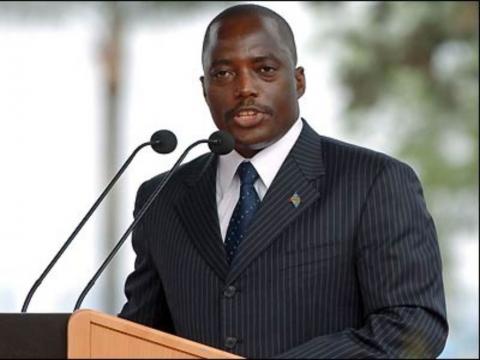By Abdul Tejan-Cole
On September 16, relatives of victims of the 2016-2017 clashes between civilians and Congolese police and army officers in Kasai Central and Kasai provinces, commonly referred to as the Kamuina Nsapu rebellion, lodged a complaint at the International Criminal Court (ICC) against former Congolese President Joseph Kabila.
The complaint also targeted senior government officials in his regime, including Emmanuel Ramazani Shadary, his Minister for Interior and Security and presidential candidate in the 2018 election, and Kalev Mutond, former head of the intelligence services.
The Kamuina Nsapu rebellion started in April 2016 following the refusal of the Government of President Kabila to recognize Jean-Pierre Mpandi as Kamuina Nsapu (meaning "black ant"), the hereditary chief of the Bajila Kasanga chieftaincy in Kasai Central.
The government decided to replace him with a loyalist chief. The death of the Kamwina Nsapu in August 2016 sparked months of fighting with the Congolese military, leaving more than 400 people dead. The UN has reportedly found many mass graves and many victims are still unaccounted for.
According to reports, the victims blame Joseph Kabila for not taking substantial measures to stop the war crimes and crimes against humanity committed by the police and army in time, protect the victims and bring the perpetrators and accomplices to justice. They allege that Kabila did not investigate the atrocities despite calls made to political and judicial authorities.
Supporters of former President Kabila have condemned this action. They see this as further ongoing efforts by President Félix Tshisekedi and his supporters to eliminate his one-time ally ahead of the 2023 elections. Relations between the two men - Félix Tshisekedi and Joseph Kabila - have worsened since the December 2018 presidential elections. Kabila, who became President in January 2001 following the assassination of his father, Laurent-Désiré Kabila, ruled Congo for 18 years. Based on the terms of a new constitution adopted in 2006, he could not contest for another term when his tenure ended in 2016. After two years of procrastination, elections were finally held in December 2018.
With Kabila not running, his Parti du Peuple pour la Reconstruction et la Démocratie (PPRD) entered into a coalition with other parties and formed Front Commun pour le Congo. They supported Emmanuel Ramazani Shadary for the presidency. Shadary performed so poorly that it was difficult to manipulate the elections in his favour. Independent observers, including the influential Catholic Conférence Épiscopale Nationale du Congo, concluded that former ExxonMobil executive, Martin Fayulu, won the elections. Africa Confidential also claimed that it was shown Electoral Commission data leaked by whistleblowers revealing Fayulu to be the real victor. But Kabila did not trust Fayulu, so he entered a deal with the candidate who, according to the leaked results, came a distant second, Félix Tshisekedi, son of former Prime Minister Étienne Tshisekedi.
The deal between Kabila and Tshisekedi included allowing Mr. Kabila to choose the Prime Minister, keep control of certain key ministries, and be consulted concerning some significant decisions. Africa Confidential also reported that it included assurances that Kabila and his key associates will be guaranteed immunity from prosecution by the International Criminal Court for alleged human rights abuses. Kabila thought the deal would hold as he had tightened control of DR Congo's major institutions: Parliament, army, intelligence services, constitutional court and electoral commission.
However, since the inception of the agreement, a power struggle between the two men ensued. Frustrated with the gridlock, Tshisekedi ended the uneasy coalition between Cap pour le Changement (CACH), which included his Union pour la Démocratie et le Progrès Social (UDPS) and Vital Kamerhe's Union pour la Nation Congolaise (UNC) and Kabila's Front Commun pour le Congo and wrested control of most of the critical institutions from his predecessor. He appointed three new judges to the powerful Constitutional Court that determines the winners of presidential elections, key Kabila allies, speaker Jeanine Mabunda and Prime Minister Sylvestre Ilunga Ilukamba, were replaced and through persuasion and some say bribery the majority of Kabila's allies in Parliament abandoned him and joined a new "Sacred Union" political grouping loyal to Tshisekedi. According to Africa Confidential, referring Kabila and his allies to the ICC may be part of Tshisekedi's strategy to increase his power and eliminate any threat his predecessor may pose.
Tshekedi, currently Chairperson of the African Union (AU), now has the upper hand. His supporters who took to the street of the DRC seeking a divorce with Kabila are now happy. The World Bank, IMF and the US Ambassador to Congo, Michael A. Hammer, who is said to have such regular contact with President Félix Tshisekedi that many refer to him as the country's unofficial deputy president, are also pleased.
But it will be foolhardy to write off Joseph Kabila. Some suspect he is planning to contest the 2023 elections. Since he left office, he has been living on his private farm in Kingakati, on the outskirts of Kinshasa. Yet, he continues to wield economic power and influence. Although some suggest that he still enjoys support within the military's senior ranks, they say he is unlikely to want to mount a coup. There are reports that he may support some insurrection, especially in the volatile eastern Congo. He is close to Gédéon Kyungu Mutanga, the warlord notorious for leading the Mai-Mai Kata Katanga rebel group seeking autonomy for Katanga province and General John Numbi, a former Inspector General of the Armed Forces - heavy weapons were discovered in his residence in Kinshasa earlier this year.
Whatever Joseph Kabila does next is anyone's guess. However, with the end of the coalition government, President Tshisekedi can no longer blame him for any of his government’s failures. He now has to take full responsibility to address the poverty and chronic corruption still pervasive in the DRC.
The views and opinions expressed in this article are those of the authors and do not necessarily reflect the official policy or position of the author’s employers.
Copyright © 2021 Politico Online (29/09/21)








